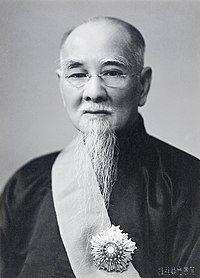Moralism (literature): Difference between revisions
m (Correction of Chinese) |
m (typo ion > in ~Vanilla) |
||
| Line 4: | Line 4: | ||
Literary Moralism soon took the form of '''Theatrical Moralism''' with another one of Gao's work, the post-war play of ''[[The Woman in Black]]'' ({{Ruby|{{lang-zh|labels=no|黑衣女人}}|Hēiyī nǚrén}}). The birth of Moralism came from Gao's question of authority and the philosophy of [[Yongheng]]. Culturally, moralism is considered to be tied to [[Huajiangite literature]] and is became {{wpl|mainstream}} literature during [[Feng Shixang]]'s reign from 1910 through 1925. Moralism also tended to portray situations within Eastern Huajiang, but also sometime took place in North and West Huajiang. | Literary Moralism soon took the form of '''Theatrical Moralism''' with another one of Gao's work, the post-war play of ''[[The Woman in Black]]'' ({{Ruby|{{lang-zh|labels=no|黑衣女人}}|Hēiyī nǚrén}}). The birth of Moralism came from Gao's question of authority and the philosophy of [[Yongheng]]. Culturally, moralism is considered to be tied to [[Huajiangite literature]] and is became {{wpl|mainstream}} literature during [[Feng Shixang]]'s reign from 1910 through 1925. Moralism also tended to portray situations within Eastern Huajiang, but also sometime took place in North and West Huajiang. | ||
During the Feng era and around the end of Gao's life, the [[1882 Huajiangite Foreign Crisis]] was resolved and both Literary Moralism and Theatrical Moralism went international, with many of Gao's books being sold in foreign markets. More authors followed after Gao's work | During the Feng era and around the end of Gao's life, the [[1882 Huajiangite Foreign Crisis]] was resolved and both Literary Moralism and Theatrical Moralism went international, with many of Gao's books being sold in foreign markets. More authors followed after Gao's work in establishing moralism. Moralism after Gao evolved to focus on {{wpl|empiricism}} and questions between {{wpl|secularism|secular authority}} and {{wpl|Religious organization|religious authority}}. Post-1950 Moralism primarily featured {{wpl|freethought}} and continued featuring the questions surrounding secular and religious authority. The most notable difference that Post-1950 Moralism took from Post-War Moralism was the fact that Post-1950's authors, such as the novelist [[Jia Kai]], playwright [[Wang Li]], and poet [[Gao-ou]] focused on portrayal of society with elements of {{wpl|naturalism}} portraying questions of authority as it was portrayed into a photograph and to sometimes, analyze and incorporate real life events. | ||
Moralism is also meant to be a contrast to {{wpl|romanticism}}, however in line with romanticism, had a complex effect on Huajiangite politics before and after the [[Great Continental War]]. Very similar to {{wpl|neoclassicism}}, Moralism within a contemporary form is normally attached with the definition of {{wpl|Equal consideration of interests|equality}}. | Moralism is also meant to be a contrast to {{wpl|romanticism}}, however in line with romanticism, had a complex effect on Huajiangite politics before and after the [[Great Continental War]]. Very similar to {{wpl|neoclassicism}}, Moralism within a contemporary form is normally attached with the definition of {{wpl|Equal consideration of interests|equality}}. | ||
Revision as of 22:41, 24 August 2019
Moralism (Huajiangite: 道德文学; Alphabetized Huajiangite: Dàodé wénxué; Moral Literature) is a Qi literary movement and writing style that emerged in 1901. The main exponent to the Moralist literary movement was Gao Wenzhong and is considered the father of Moralism. His literature peaked in the the post-war novel A Question for Wellington (
Literary Moralism soon took the form of Theatrical Moralism with another one of Gao's work, the post-war play of The Woman in Black (
During the Feng era and around the end of Gao's life, the 1882 Huajiangite Foreign Crisis was resolved and both Literary Moralism and Theatrical Moralism went international, with many of Gao's books being sold in foreign markets. More authors followed after Gao's work in establishing moralism. Moralism after Gao evolved to focus on empiricism and questions between secular authority and religious authority. Post-1950 Moralism primarily featured freethought and continued featuring the questions surrounding secular and religious authority. The most notable difference that Post-1950 Moralism took from Post-War Moralism was the fact that Post-1950's authors, such as the novelist Jia Kai, playwright Wang Li, and poet Gao-ou focused on portrayal of society with elements of naturalism portraying questions of authority as it was portrayed into a photograph and to sometimes, analyze and incorporate real life events.
Moralism is also meant to be a contrast to romanticism, however in line with romanticism, had a complex effect on Huajiangite politics before and after the Great Continental War. Very similar to neoclassicism, Moralism within a contemporary form is normally attached with the definition of equality.
